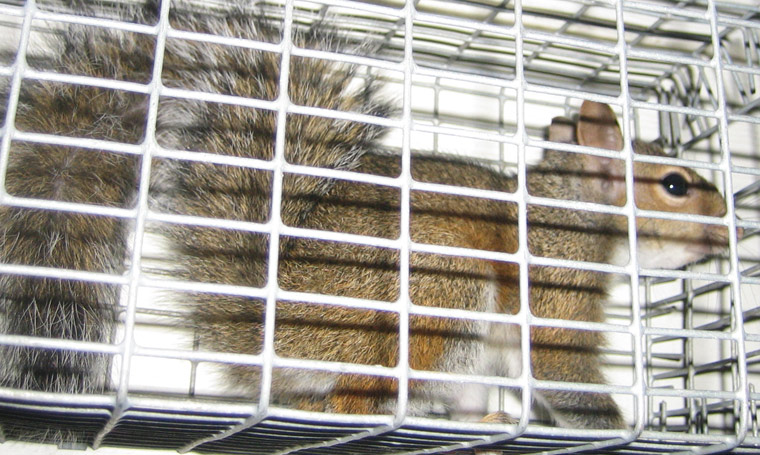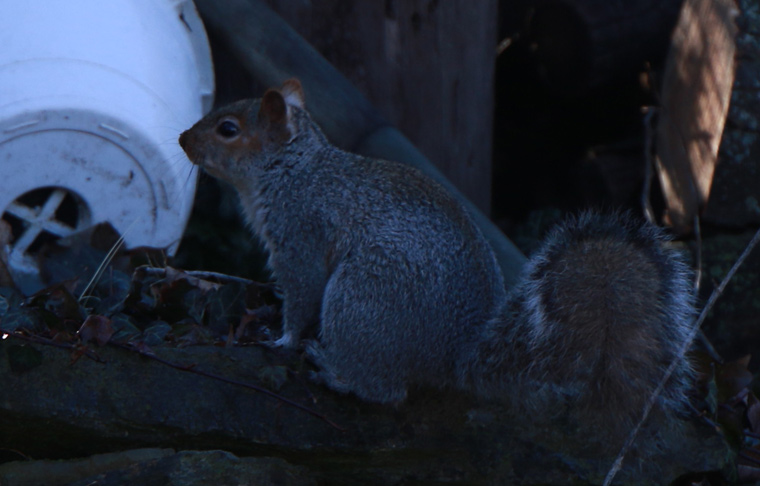- info@wildlife-removal.com
Call us for help in your town
Wildlife Removal Education
There's a Squirrel in My House … What Do I Do
Need squirrel removal in your hometown? We service over 500 USA locations! Click here to hire us in your town and check prices - updated for year 2020.
First thing’s first; do not panic. Panic is the very worst thing that you ca do when you find a wild animal in your home, because that’ll send the animal into panic too. They can sense your fear and, very often, it heightens the animal’s sense of fear. Utter chaos and panic is not something you want when you are faced with a wild critter, such as a squirrel in your home.

Making any sudden movements will result in the squirrel going absurdly crazy, and more than likely running around your home at what seems like one hundred miles an hour. You won't ever be able to grab it; there's very little point in chasing after it. If anything, you'll probably just drive the animal far out of reach and perhaps out of eyesight too. Losing the animal isn't wise.
You should ensure that your pets, kids, and other household members don't come close to the squirrel. There is a slight chance that any squirrel you up against could carry and, therefore, transmit the rabies virus. You should also shut doors that lead to other rooms in the building. Once again, you won't want to lose this animal in your home, so confining it to one room is quite important.
You may find that opening a window or back door (into the front or back yard) will be enough to encourage the creature to leave. If that doesn't work, a broom handle gently massaging the creature towards the door might just work. You will need to be careful when trying to make contact with the squirrel, even when you have a long, wooden stick between you. The squirrel is likely to be unpredictable and that means it could lash out at you. Being caught unaware isn't a good idea, so make sure you're paying a lot of attention.
Although it might not be the first thing you think of when faced with a squirrel in your home, you will need to look and see whether or not the squirrel is alone. If no back door or window is open, it might not be immediately obvious where the squirrel has managed to gain access. It could be that the squirrel has entered your home through the attic, but, being at the bottom of the house now, you might not associate one with the other. The last thing you will want is for a mother to be locked out and her youngsters to be locked in, in the nest.
If you don't know what to do, or can’t seem to find a way to get the squirrel out of your home, we suggest that you call local animal removal experts.
The REAL Way to Keep Squirrels Out of Your Home
As you trawl the internet to find successful ways of getting rid of squirrels, you should know that a lot of the information you find will contradict itself and prove useless. You will see information about light repellents and high-pitched sound devices that are designed to keep animals just like squirrels at bay. The reality, of course, is that they often don’t and end up being an expensive gimmick that you were sadly lured in by.

As the old saying goes, “If it looks too good to be true, it probably is.”
If repellents really worked to keep squirrels at bay, how come we’re still having so much of a problem with them? There is no one-size-fits-all approach to wild critter removal, and especially squirrels.
Here are the ways that actually work:
1 - Wildlife eviction fluid
Made up of the urine and other bodily secretions from predatory animals, such as coyotes, foxes, wolves, and raccoons, many smaller mammals and pests are terrified by the scent of such things. Wildlife eviction fluid has been shown to evict squirrels and other animals, including raccoons, by scaring them away. A female caring for youngsters will believe that her family is in danger when these larger predators are close by, so moving her young to a safer spot becomes very important.
Sadly, eviction fluid alone is not going to be enough to get rid of squirrels. You will need to combine that approach with others, including the next steps.
2 - Garden cleanup & food removal
If you take away all the food that a squirrel could eat out of your back yard, it doesn’t really have a reason to stick around. Removing all food sources won't immediately solve your problem because squirrels stash/hoard food for later consumption. It is good to have a backup plan, especially when you're a wild animal who will need to survive a long and touch winter.
As well as removing all sources of food (bird feeders, pet food, securing away certain plant life that might appeal to squirrels), you should also have a good cleanup of your property. Trees should be regularly trimmed. This will prevent animals, including squirrels getting an easy ride right up to your roof, but will also take away hiding spots for wild animals. If they have nowhere to hide, the property isn't safe. Any ol’ predator could come along and snap it up, and no wild animal is going to put themselves at risk of that.
3 - Exclusion devices
Exclusion is a great way of getting stubborn wild animals out, by using a contraption that looks very much like a trap, but that doesn't confine the animal. If you would rather not get overly involved with the squirrel removal process, exclusion devices are a great approach to look at.
The device itself lets the squirrel out to travel wherever it likes once the door has been shut, but it won't be able to get back into the property using that particular entrance point any more. Once the door has been shut, it's been shut, just like trapping a squirrel in a cage. As long as you have no other holes that the squirrel can use to get in, the eviction is complete. That is unless you have squirrel babies on your hands, of course.
4 - Trapping
If you do have a squirrel with babies in a nest, exclusion is a very bad approach to take because you then run the risk of killing all of the youngsters. The mother is free to get out of the attic, but if her youngsters are not yet ready to leave the nest, they won’t use the exclusion device and follow her. She's locked out, the kids are locked in … If she can't feed them or care for them, you'll have a disaster on your hands; a bigger one that you already had to start with.
That's where trapping can help.
There is no absolutely no chance that you'll be able to catch a squirrel with your gloved hands (because you wouldn't want to touch it with your bare hands, that's for sure), but trapping allows the squirrel to confine itself of its own accord, using food as the perfect luring tactic. You can also use squirrel youngsters if you happen to know where they are. The mother will l need to leave them alone at some point, otherwise, she won't be able to feed herself or them. That's why she has picked your attic or home — it is a space that keeps her young safe until she returns.
When the mother leaves, you can grab the babies (with gloved hands) and use them as bait. A mother will only second-think for a split second before she chases right on after her family, and this is a fact that tends to go across the board for wild animal invaders.
Final note: Make sure you check the laws in your state before you start trapping squirrels. They are classed as game animals in some places, which means that you will need a permit to remove the problem legally.
5 - Building sealing & waste cleanup
Once everything has been done — the animal has been evicted and you have tidied up your back yard — you can then go ahead and seal up the property. You can’t seal up before the entire family of squirrels have been removed (and you can guarantee this), otherwise, you’ll run the risk of locking them in and killing them too.
Sealing up your property is essential, not just to keep out squirrels, but other wild animal species that are likely to invade. Rats and mice need the tiniest hole to gain access, and a squirrel can easily chew on that hole to make it bigger, a raccoon coming along after it and using dextrous paws to tear inside. There is a food chain — it will happen right in your home if you do not break the chain.
While you’re sealing, make sure you remove all waste, and do this in the safest and most appropriate way. Fecal matter and urine can spread a number of diseases, and dead carcasses of squirrels can be responsible for the spread of more.
Go back to the Squirrel Removal page, or learn tips to do it yourself with my How to Get Rid of Squirrels guide.


















